Key takeaways:
- Social innovation marketplaces facilitate collaboration, amplifying the impact of creative solutions to social challenges.
- Securing grants provides not only financial support but also validation and opportunities for partnerships and collaboration.
- Building relationships with grantors through consistent communication and expressions of gratitude can transform one-time funding into long-term alliances.
- Embracing the grant-seeking journey as a process of dialogue rather than just a means to an end fosters personal growth and improves proposal quality.
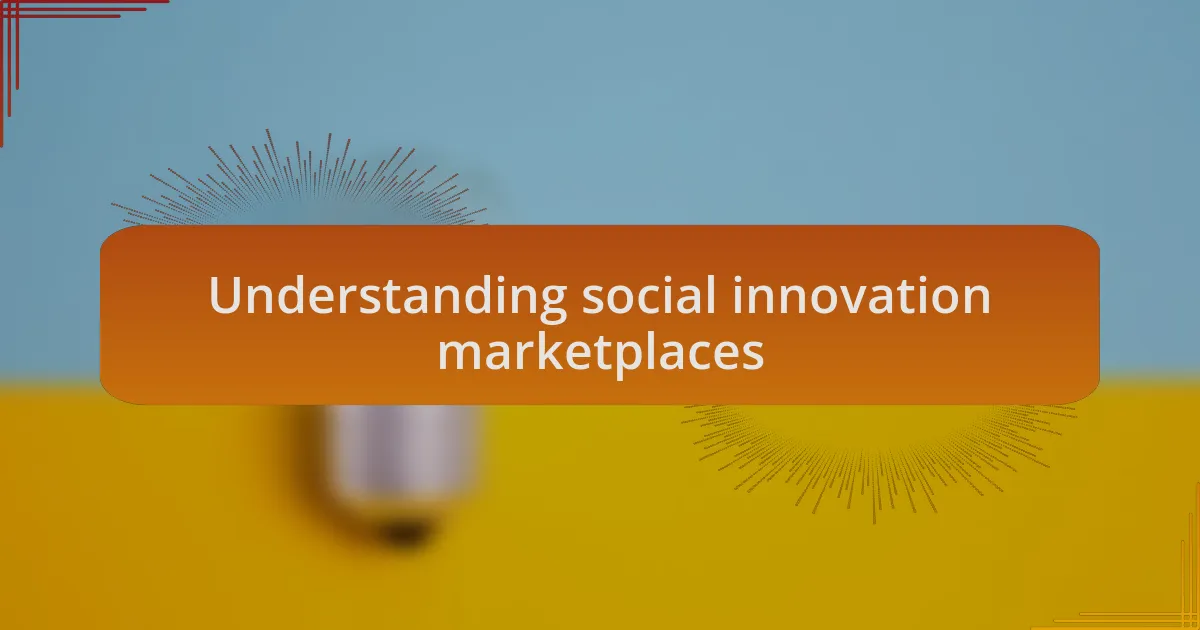
Understanding social innovation marketplaces
Social innovation marketplaces are fascinating hubs where creative solutions to social challenges can thrive. I remember when I first stumbled upon one; it felt like discovering a treasure chest filled with ideas that could change lives. These marketplaces connect individuals, organizations, and funders, allowing them to collaborate and share resources, thereby amplifying the impact of innovative projects.
As I delved deeper into this world, I realized that social innovation is not just about having a great idea; it’s about fostering a supportive ecosystem. Have you ever wondered how one single idea could grow into a larger movement? It’s here in these marketplaces that ideas mingle, partnerships form, and the collective feedback from diverse stakeholders propels initiatives forward more effectively than any lone effort could achieve.
Engagement in these spaces often ignites a passion within me. I’ve witnessed firsthand how a simple connection can lead to unexpected opportunities, whether it’s a mentor guiding a fledgling project or a funder inspired by a compelling story. The emotional energy and commitment of individuals working together create a ripple effect that can redefine what’s possible in addressing societal issues. Isn’t it incredible to think about the change we can catalyze when we come together in such vibrant spaces?
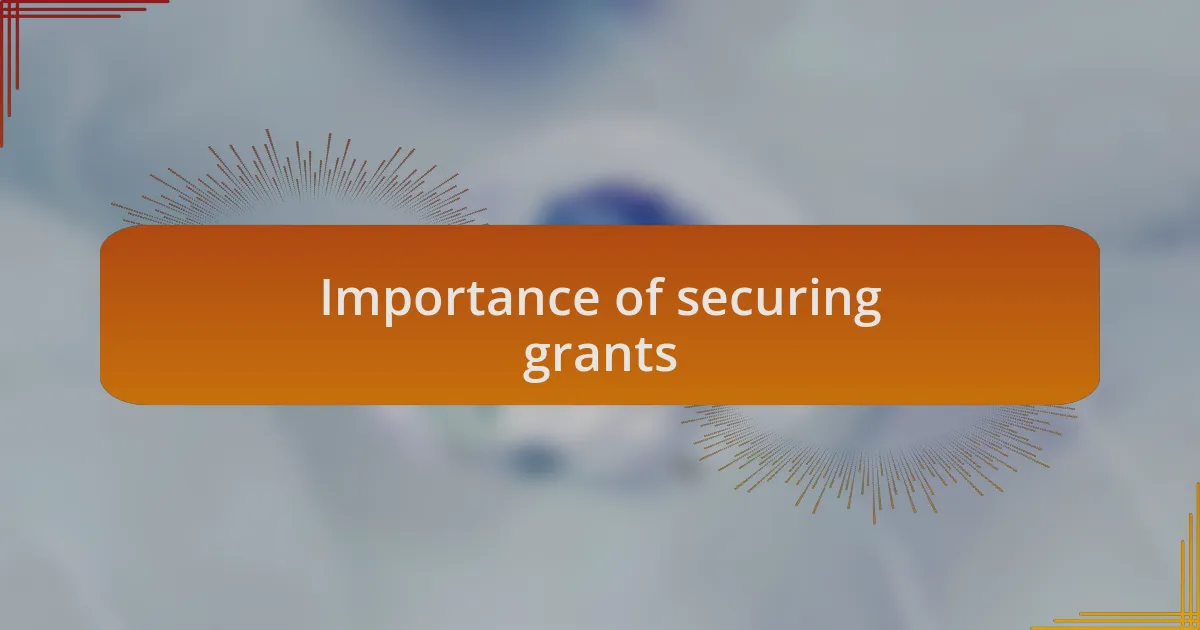
Importance of securing grants
Securing grants is crucial as it provides the financial foundation necessary for turning innovative ideas into tangible solutions. When I applied for my first grant, I felt a mix of excitement and apprehension. Would my vision resonate with funders? This financial backing not only fuels projects but also lends credibility, making it easier to attract additional support and partnerships.
From my experience, grants do more than just contribute funds; they validate your work and passion. I remember when I received my first grant notification—it felt like a confirmation that my efforts were recognized and worthy. This sense of validation can be incredibly motivating, pushing you to deliver on your promises and amplify your impact in the community.
Additionally, securing a grant often opens doors for continued funding opportunities and potential collaborations. Have you considered how the initial support can lead to a network of advocates? Each grant received has unique requirements and expectations that can refine your approach and strengthen your project’s sustainability. In this way, securing a grant is not merely a financial transaction; it’s a steppingstone toward a broader vision of social change.
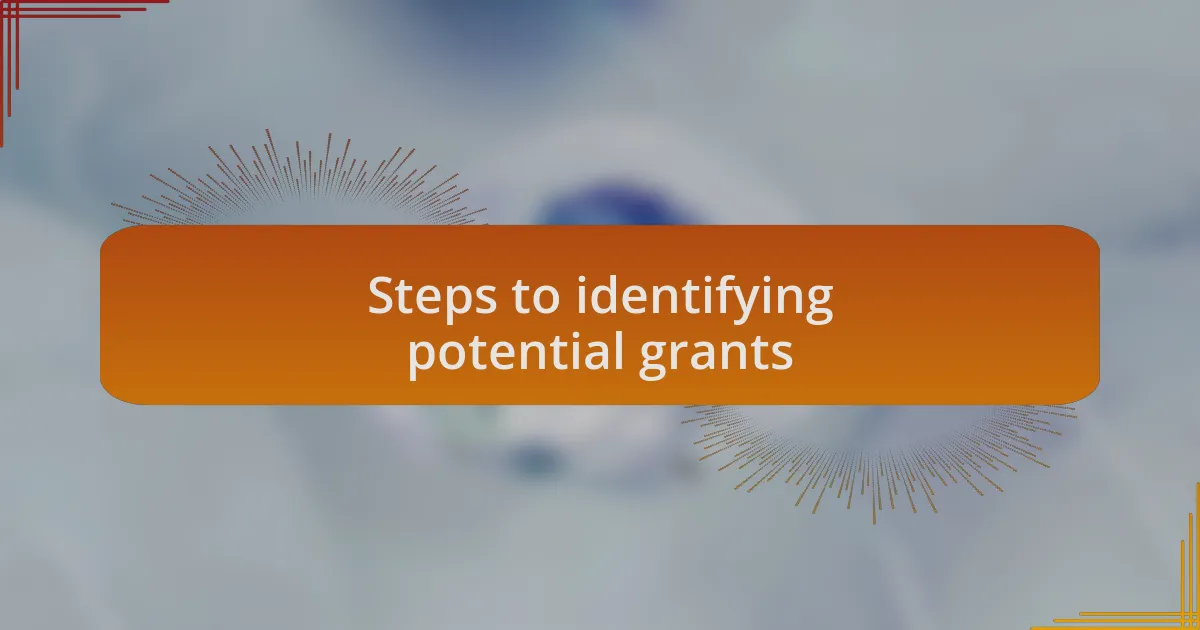
Steps to identifying potential grants
Identifying potential grants begins with thorough research. I often start by exploring online databases and resources dedicated to funding opportunities. One evening, I spent a few hours scrolling through listings, and I was amazed at how many programs were available for someone in my niche. It taught me that even a small-time idea can find a home with the right funding, but the key is knowing where to look.
Next, I recommend narrowing down your options based on your project’s specific goals. Ask yourself: What are the objectives of my initiative? I recall crafting a focused list of grants that aligned with my mission. This thoughtful approach not only saved time but also allowed me to connect more deeply with the funders’ priorities, showing that I understood their goals.
Lastly, reaching out to previous grant recipients can offer invaluable insights. Have you ever had a conversation that changed your perspective? When I spoke with someone who had successfully secured funding for a similar project, their advice clarified my understanding of how to present my proposal. It was a lightbulb moment, revealing the importance of networking and learning from those who have walked the path before.
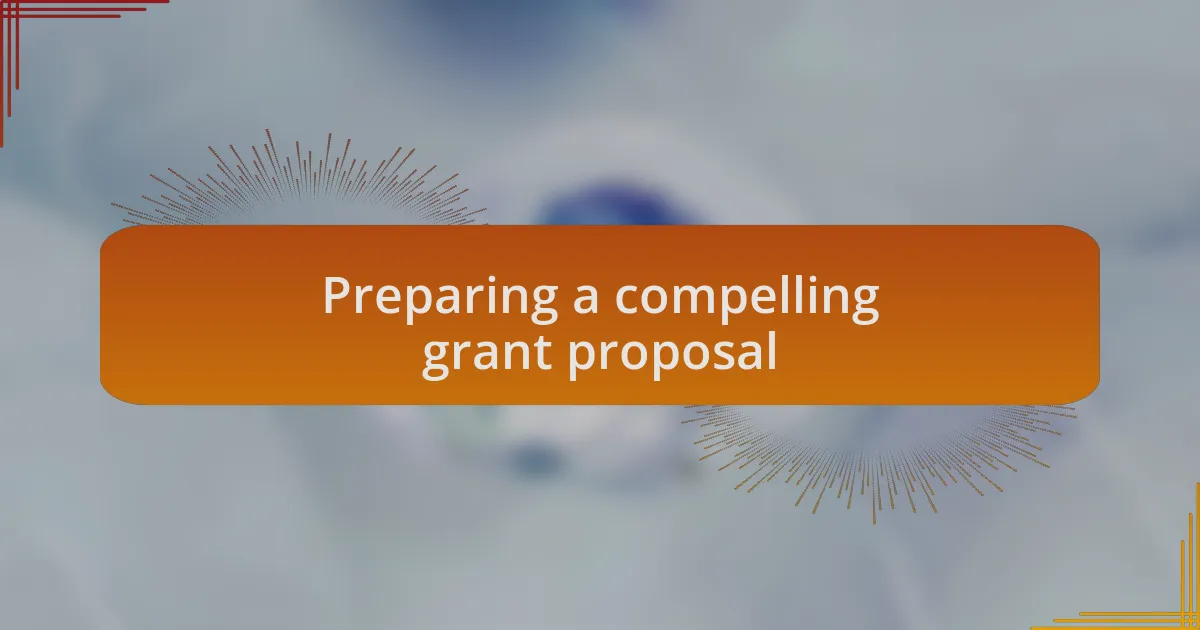
Preparing a compelling grant proposal
When preparing a compelling grant proposal, clarity is vital. I remember spending an entire weekend polishing my proposal, ensuring every section conveyed my project’s essence in a straightforward manner. Have you ever tried to summarize a complex idea in just a few sentences? It can be challenging, but I discovered that simplicity not only makes reading easier for funders but also highlights the core of what you want to achieve.
Equally important is understanding the funder’s priorities and tailoring your narrative to resonate with them. In one instance, I restructured my proposal to emphasize how my project aligned with the funder’s mission. The moment I shifted my focus to their goals, I felt a surge of confidence. It made the connection feel more like a partnership rather than just a transaction.
Lastly, don’t underestimate the power of storytelling. I often weave personal anecdotes into my proposals—one such story about a local community’s struggles truly captured the attention of my reviewers. I believe that sharing real-life experiences can bring your proposal to life and compel reviewers to see the human side of your project. Isn’t it impactful when a proposal doesn’t just inform but also connects on an emotional level?
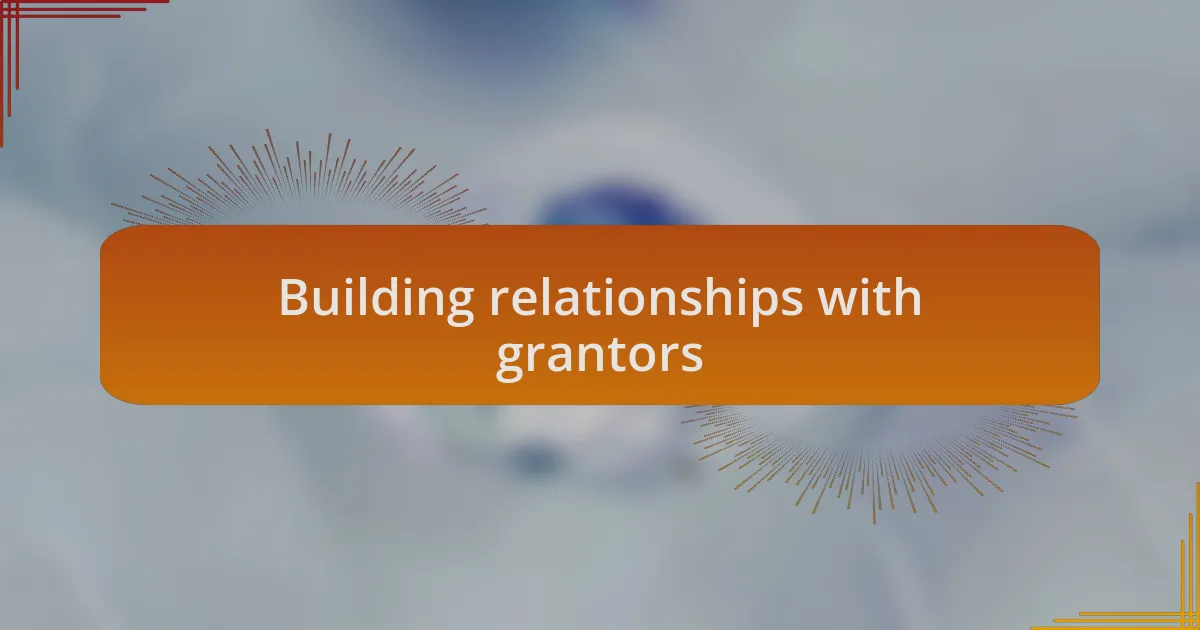
Building relationships with grantors
Building strong relationships with grantors is foundational in the grant-seeking process. I recall attending a networking event where I had the chance to engage with a funder in a casual setting. Our conversation started about shared interests in social innovation, and by the end of the evening, I felt not just like a grantee, but like part of a larger mission. Have you ever felt how personal connections can truly reshape professional dynamics?
It’s essential to maintain consistent communication after the initial outreach. I remember sending periodic updates about my project to a grantor who showed early interest but hadn’t committed yet. Not only did this show my dedication, but it also kept the lines of communication open, making it easier to approach them when the time was right.
Lastly, don’t underestimate the power of gratitude. After receiving a small grant, I made it a point to express my appreciation through a heartfelt note. The funder later shared how the gesture made a significant impression on them. How can such simple acts transform a professional relationship into a lasting partnership? From my experience, they can turn a one-time grant into a long-term alliance that supports ongoing innovation.
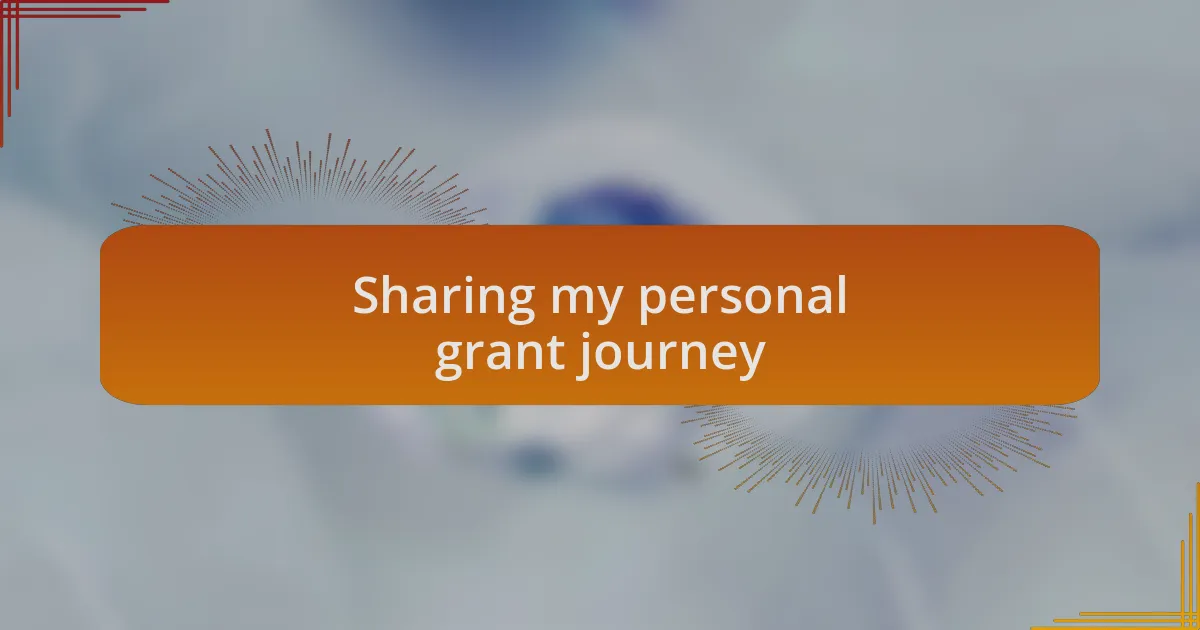
Sharing my personal grant journey
When I first embarked on my grant-seeking journey, I had no idea how much personal investment it would require. I remember standing in front of my computer, nervously drafting my first proposal, feeling a mix of excitement and apprehension. Did I convey my passion clearly? I sent it off with a hopeful heart, but the waiting felt like an eternity.
As I progressed, I learned that my initial naivety had its clouds of uncertainty. A pivotal moment came when I received constructive feedback from a grantor who didn’t choose my project. Instead of feeling defeated, I viewed it as a learning opportunity. How many times do we miss valuable lessons in our pursuit of success because we focus too heavily on rejection? Armed with their insights, I refined my proposal, shifting my perspective from viewing grant applications as a one-way ticket to success to seeing them as dialogues toward improvement.
Reflecting on this experience, I realize that vulnerability plays an essential role in the journey. Each proposal was a piece of my soul, imbued with my vision for social change. Did I dare to display my authentic self every time I submitted a grant? It took courage, but it was that honesty that eventually drew a funder to my cause. My journey taught me that grant seeking is not just about funding; it’s about forging bonds through shared values and aspirations.

Lessons learned from my experience
Throughout my grant-seeking journey, I discovered that persistence is key. I remember a particular instance where I applied for a grant that I was convinced was a perfect fit. After a few weeks, I received a polite rejection. Instead of giving up, I reached out to the grantor for feedback. That seemingly small step opened doors to deeper insights that I never would have gained otherwise. Have you ever wondered how much a simple inquiry can reshape your approach?
I learned the importance of tailoring my proposals to the specific values of the funders. In one case, I initially submitted a generic application, thinking my work spoke for itself. But then I pivoted, focusing on the unique mission of the funder and aligning my project with their goals. The difference was palpable—when I re-engaged with the funders on their terms, my message resonated more profoundly. Isn’t it fascinating how understanding another’s perspective can transform your own narrative?
One of the most valuable lessons was embracing the journey rather than fixating solely on the outcome. When I shifted my mindset to view each proposal as an opportunity for dialogue, my anxiety lessened. I started to find joy in crafting and sharing my vision, learning something new with each application I submitted. Have you experienced that shift where the process itself becomes a meaningful endeavor?